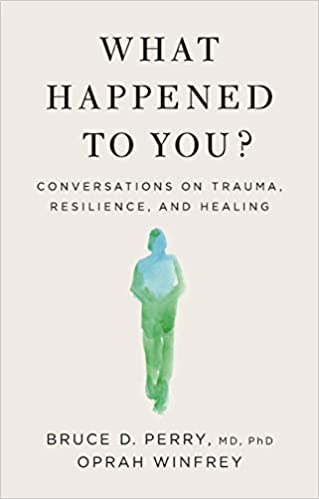What Happened To You?

This blog is like a book report of a very informative book written by a Psychiatrist, Dr. Bruce Perry.
When I was in grad school, studying community and trauma counseling, the question “What happened to you?” was ingrained in my brain. I learned that we are who we are because of what happened to us.
In my counseling practice (and honestly, even in my interactions outside of counseling), I always wondered what happened to this individual that makes them react, feel or think a certain way. I don’t tend to ask WHY they do that, or think that or feel that way, because something about the question “why” make most of us feel judged, blamed or shamed. Rather the question, “What happened?”, sends a message of concern, understanding, empathy and even support. Even when I was working as a paramedic, we were trained to use the word “why” less, therefore I went into the counseling field slightly knowing how to avoid using the “why” word.
The What Happened To You book is an interview with Dr. Perry by Oprah about traumas. How the effects of trauma stretch far and wide across generations and across communities and it’s important to always come back to our central question with compassion of What Happened To You.
Our brains develop as a reflection of the world we grow up with.
You love others the way you’ve been loved.
Trauma is generational. Children are very contagious to the emotion of the people around them. The beliefs, skills, traits and emotions of the people we were surrounded with are transmissible. Children absorb the beliefs, good and bad, of influential adults. We do pass things to the next generation.
As we become adults, we are attracted to the things that are familiar (good or bad).
We feel better with the certainty of misery than the misery of uncertainty.
My clients understand the importance of being aware of their patterns – we work together on recognizing their patterns. Patterns run through a person’s life — and ran through their parents’ and grandparents’ lives. When we don’t recognize them, it is very difficult to change.
It takes time, patience and therapeutic help to make positive and healthier changes.
Most people think that therapy is something that involves going in and undoing what happened.
But your past experiences created in your brain exists and cannot be deleted.
Therapy is about building new associations, making new, healthier, default pathways.
Therapy is building a better alternative, a new default.. and it takes repetition and time.
In the wake of trauma, the hardest thing to understand is that nothing and no one can take away the pain.
The impact of trauma doesn’t simply fade away.
We can help each other heal, not through grit or resilience but through empathy, patience, support and connection.
Our brains are malleable.
Know that children were not born resilient, they were born malleable.
We are always changing. We change from all of our experiences — good and bad. Because our brains are malleable.
Healthy development and changes involve a series of challenges and exposure to new things. And failure is an important part of the process.
We try.
We fall.
We get up.
We try again.
and again.
All successful changes come after failure and typically many failures will occur before mastery is achieved. Therapy is not a one time thing – its trying, falling, getting up, trying again, and again.
It’s about becoming aware and then practicing:
REGULATING
RELATING
REASONING
We all need to get better at listening, regulating and reflecting. Learning how to approach an interaction from a regulated, empathetic stance and spreading a kinder emotion.
A dysregulated adult cannot regulate a dysregulated child. An exhausted, frustrated, dysregulated adult can’t regulate anybody else. That’s why self-care is important because it helps regulate us.
If you don’t give back to yourself, you simply will not be effective as a first responder, teachers, healthcare professional, leader, supervisor, parent, partner or anything.
SELF CARE IS HUGE and therapy helps you with that.
Trauma and adversity, in a way, are gifts, according to Dr. Perry.
Post traumatic growth and post traumatic wisdom is when we have loved through adversity, we come to a point in our lives where we can look back, reflect, learn and grow from the experiences.
It’s hard to believe human kindness unless you know a little bit about adversity. Adversity, challenges, disappointment, loss, trauma — all contribute to the capacity to be empathic and to be wise.
What happened to you doesn’t just go away.
Childhood experiences can impact you in many ways. Traumas don’t get deleted. There are ways to help people to heal. There are ways to help make the trauma easier to carry.
Support, connection, empathy and love can do that…
Read the book and learn more: HERE
Sentences in italic were taken straight from the book
